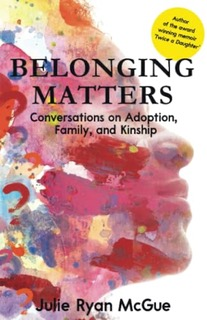"Caught in the Middle" by Guest Blogger, Julie Ryan McGue
“Caught in the Middle”
By Julie Ryan McGue
The needle on my inner compass leans towards positive. So, when I consider my adoption, I tease out two things for which I can be grateful. In the Baby Scoop Era during which I was adopted, the firm policy at Catholic Charities was to place multiples in the same adoptive family. I can’t imagine advancing through life without my identical twin sister as a collaborator, confidante, and co-conspirator. And I’m glad I waited until I became a middle-aged woman with scores of lived experiences before tackling adoption search and reunion.Adopted together as infants, we seemed always to have known about our adoption. Ours was a closed adoption, so our adoptive parents were given no information about our first family.
Two years later, our parents adopted a little boy, and then as so often happens, my mother’s infertility issues abated. By the time we became teenagers, my twin and I were the oldest of six, a blended family of three adoptees and three biological children. To be fair, my parents worked hard at treating us all as equals, same set of rules, expectations, allowances, and punishments for screwing up.
Around our birthday––or whenever they had more than a few cocktails––our parents took us into the living room and professed how much they had wanted my sister and me, and how much they loved us. We had no reason to doubt them. We knew that taking on twins was a daunting task, but for an infertile couple, we were an instant family.
In those “adoption chats,” our folks also expressed, “We will help if you ever want to look into your adoption.”
That stilted conversation always made me uneasy. Looking back, I probably sensed that my folks were voicing a sentiment that some social worker told them they should say. I also intuited that if my sister or I expressed any interest in looking for birth relatives, we would make them unhappy. I didn’t need or want that. I only wanted to please them. Like many adoptees, I harbored the fear that if we failed to please our adoptive parents, they might discard us like our birth parents had done.
Fast forward to when I turned 48 and was sent for a breast biopsy. I returned from that procedure, and my husband issued a demand. “Get at your family background. Your health, and our children’s well-being are at stake.”
So, yours truly, the ‘reluctant searcher,’ convinced my twin sister to join me on the uncertain path of a search for family history. When I sat with my seventy-something parents in their senior living apartment and revealed my news, I wasn’t surprised at their reactions. Dad nodded agreeably and my mother dished out her patented brand of passive aggression. How can displeasure be so poignant when not one word is spoken?
Challenged by ongoing health issues, confused about how to launch a search––genetic genealogy was still in its infancy––and conflicted about my “right to know” versus pleasing my parents, my twin sister and I forged ahead. In my first book, Twice a Daughter: A Search for Identity, Family and Belonging (She Writes Press), I detail our five year search. To cross the finish line, we used an online search agency, our adoption agency, a PI, an intermediary, a judge, a genealogist, and several social workers. During all those efforts, my mother wanted no part of my struggles. A serious rift developed between us.
I found my mother’s behavior shocking. Because we had cemented a five-decade mother-daughter relationship, I thought she’d have found security in that. Her rigid anti-search stance pricked at a memory, brought some family history to light, and that knowledge forced me into a righteous realization.
About a decade before my breast biopsy, a younger brother (one of my parents’ biological children) found himself parenting three young children alone. My mother swooped in. She did not just bring over meals and stock his fridge, she mothered. She cleaned his house, organized the kids’ clothes, picked them up from school, took them to the dentist, sang and played with them. Almost single-handedly, Mom got my brother back on his feet. The well-being of her family had been threatened, and she rose to the challenge. Kudos.
As I reflected upon her selflessness, I juxtaposed it upon my own adoption search. My health was at risk, and the well-being of my four children was threatened by the lack of information courtesy of closed adoption. I asked myself why my needs were different than my brother’s had been. Why had my mother addressed my brother’s predicament with such vigor, yet she showed distaste and disinterest in my project. Was it a preference for a biological offspring, or was she afraid she might lose me to “my other mother”? The answer lies in the depths of my mother’s heart.

My “other mother” also kept secrets in her heart. After her initial rejection of my sister and me––a void that lasted nine months and was negotiated by a talented intermediary––we entered a tentative reunion. Once the honeymoon period ended, obstacles began to crop up faster than weeds grow in June. Despite our numerous requests, she delayed in widening “the circle of who knows.” My sister and I cut her slack, reasoning that over time she would eventually reveal her secret to our biological kin.
So, while we offered loving patience, she challenged us with repeated insensitive behavior. She developed a habit of introducing my sister and me to strangers, not as her daughters, but as “visitors from Chicago.” For fear of jeopardizing our tenuous relationship with her, we bore these painful slights with grace. When our birth mom moved into a senior center, the situation worsened. She refused to let us sign in at the reception desk. We were told to meet her in the lobby where she would register us. I don’t know what she wrote in the guest log, but I suspect it wasn’t “birth daughters.”
Thanks to books like Ann Fessler’s, The Girls That Went Away, I’m cognizant and sympathetic to the crucifying shame and indignities women like my birth mom faced in the era before Roe v. Wade. Shame, blame, and fear invaded her being, infused her self-concept, and refused to let go. Softening her attitude for our benefit has proven a herculean task. What I wanted was to have been readily welcomed into my first family. What I got was far less. I have grown to accept “what it is and isn’t,” just as I faced my adoptive mother’s stance on my search.
And so, I close with a question and a reflection. Why must adoptive children and adult adoptees be placed in the position of being second best to both sets of parents, or worse yet forced to choose an alliance? If I had launched my adoption search when I was a younger woman, the challenges to my psyche would have been debilitating. As a mature adult I am better able to order these relationship disappointments and rejections among life’s other significant challenges.
But I must admit, reprioritized by two mothers, and caught in the middle of their combined inconsideration and disrespect is daunting, something no one regardless of their age should face.
.jpeg)
Julie Ryan McGue is an American writer, a domestic adoptee, and an identical twin. In her books, essays, and blogs, she explores the topics of finding out who you are, where you belong, and making sense of it. Her award-winning memoir, Twice a Daughter: A Search for Identity, Family, and Belonging, released in May 2021. Her work has appeared in multiple journals, anthologies, and online sites, such as the Story Circle Network Journal, Brevity Nonfiction Blog, and Severance Magazine. Her latest book, a collection of essays titled Belonging Matters: Conversations on Adoption, Family, and Kinship released in November 2023. Her third book, another memoir and prequel to Twice a Daughter, debuts in February 2025. Julie splits her time between northwest Indiana and Sarasota, Florida.




Comments
Post a Comment